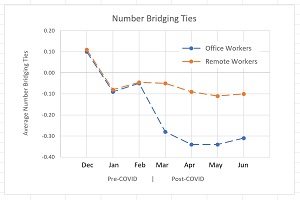In-Depth
The Effects of COVID-19 on Business Collaboration
An analysis suggests the shift to remote work at Microsoft resulted in fewer formal connections between groups, which resulted in groups becoming more isolated.
- By Pure AI Editors
- 10/04/2021
A group of Microsoft analysts investigated how work collaboration patterns at their company changed due to the ongoing COVID-19 pandemic. The results were published in an online article titled "The Effects of Remote Work on Collaboration Among Information Workers" by L. Yang, D. Holtz, S. Jaffe, S. Suri, S. Sinha, J. Weston, C. Joyce, N. Shah, K. Sherman, B. Hecht and J. Teevan (September 9, 2021) on the Nature Human Behavior web site.
The analysis suggested that the shift to remote work at Microsoft has resulted in a reduction of the number of formal connections between groups, which in turn has resulted in groups becoming more isolated. It's logical to assume that more isolation within a company will likely reduce creativity and innovation.
Main Conclusions of the Data Analysis
Even though the analysis is purely correlational and therefore doesn't show cause and effect, the data and conclusions conform to common sense. Additionally, even though the analysis applies directly only to Microsoft -- a very large tech company -- the implications may be relevant to many companies, regardless of company size or company business type.
According to the article, overall, the number of American employees who work from home jumped from less than 5 percent to roughly 37 percent following the start of the pandemic in March 2020. The goal of the data analysis was to see what changes this shift in primary work location produced, and to speculate how work patterns might change when the pandemic ends (assuming that there will be an end).
Data from approximately 60,000 employees during the period December 2019 to June 2020 was collected and examined. The data analysis revealed that the shift to remote work caused a reduction in the interconnections between both formal business groups and informal communities. See Figure 1. This reduction in communication diversity has potential negative consequences for business creativity and innovation.
 [Click on image for larger view.] Figure 1: The number of between-group bridging ties decreased significantly after the onset of COVID-19 for traditional office workers.
[Click on image for larger view.] Figure 1: The number of between-group bridging ties decreased significantly after the onset of COVID-19 for traditional office workers.
Additional Conclusions
In addition to reducing between-group connections, remote work appeared to increase the number of within-group connections. Put somewhat differently, Microsoft employees added fewer new collaborators from different groups, but removed fewer collaborators from their existing groups.
An additional, somewhat surprising finding was that after the start of the COVID-19 pandemic, the total amount of time Microsoft employees spent in meetings actually decreased by approximately 5 percent compared to pre-pandemic levels. The analysts hypothesized that the reduction in time spent in meetings was possibly due to indirect factors, perhaps such as the increased amount of time a parent needed for at-home school and childcare.
The data analysis indicated that during the pandemic employees are spending more time on asynchronous communication -- email and instant messaging. The analysts speculated that the decrease in the number of in-person meetings and verbal communication combined with the increase in the use of email for communication may make it more difficult for employees to communicate and process complex information of the kind that's needed to create innovative systems. The article suggests that companies might be well advised to implement new processes to try to help workers acquire and share new information across groups.
Anecdotal Observations
The Pure AI editors spoke to Dr. James McCaffrey from Microsoft Research. McCaffrey commented, "The data presented in the web site article agrees closely with what I've been seeing in our projects that require collaboration between groups."
He added, "The goal of the program I direct is to infuse advanced artificial intelligence and machine learning systems into products and services. These efforts require communicating very complex ideas along with coordinating complicated logistical information. We're finding that real-time person-to-person communication is critically important for the design of innovative new systems and algorithms, but that email communication is highly effective for managing our logistical activities."
McCaffrey noted, "Many of my colleagues and I agree that unplanned impromptu conversations, often next to the workplace coffee machine, are extremely important for generating new ideas. Remote work largely eliminates this idea-generation channel."
Friends at Work
The move to remote work due to the pandemic could have indirect consequences too. It's not a stretch to believe that remote working makes it more difficult to establish personal friendships at work. It is known that having personal friendships at work is beneficial.
A Gallup poll of more than 5 million adult workers found that 56 percent of the people who said they have a close/best friend at work described themselves as engaged and productive. Of the employees who said that they don't have a close/best friend at work, only 8 percent of described themselves as engaged and productive. In short, remote work creates fewer work friendships, which reduces employee engagement.
The importance of workplace friendships is supported by research too. The paper "Interpersonal Relationships and Task Performance: An Examination of Mediation Processes in Friendship and Acquaintance Groups" by K. A. Jehn and P. P. Shah, published in the Journal of Personality and Social Psychology, explored the idea. The researchers found that groups with strong pre-existing friendships performed better on projects requiring collaborative thinking than groups that contained just acquaintances. The paper observed that people who work with close friends were more committed to projects, and were more honest and constructive when providing feedback.